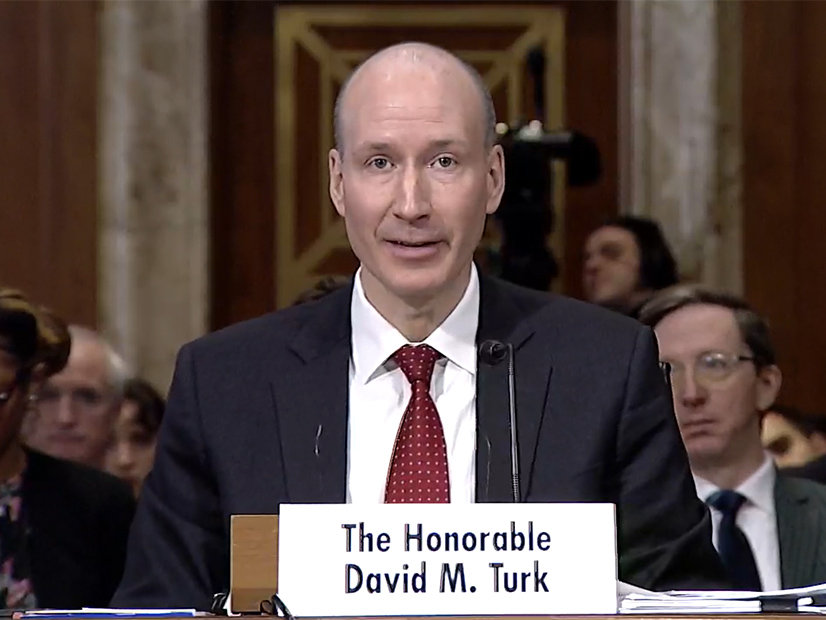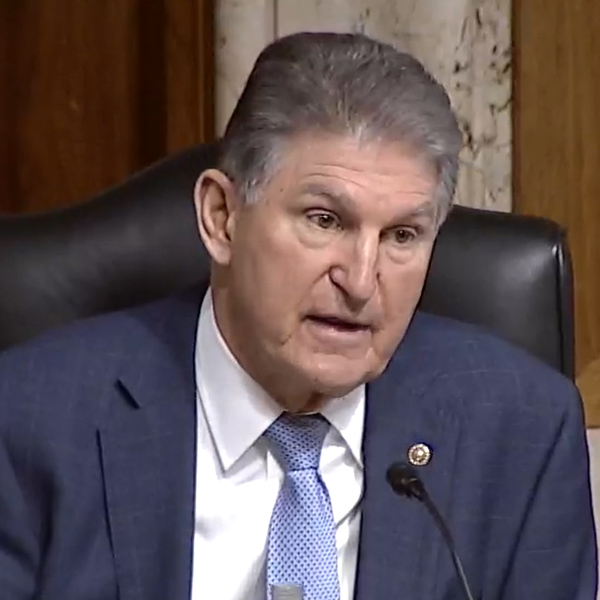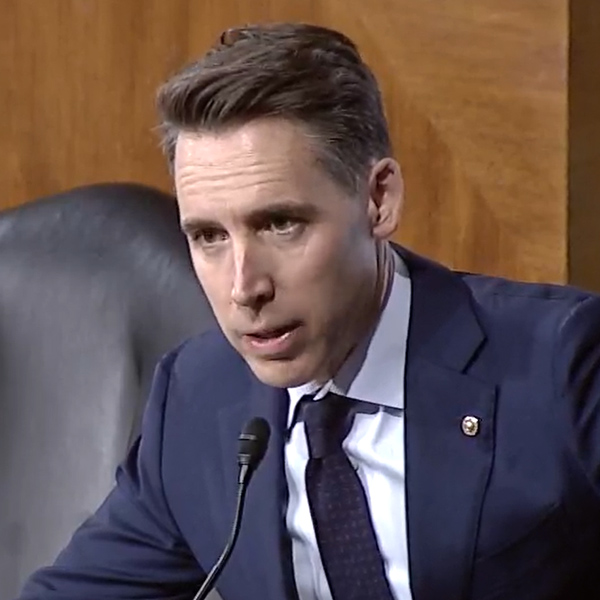
A political war is looming over the interpretation and implementation of both the Infrastructure Investment and Jobs Act and the Inflation Reduction Act, with Sen. Joe Manchin (D-W.Va.), a key architect of both laws, attacking the White House on its efforts to circumvent what he sees as their clearly stated congressional intent.
 Sen. Joe Manchin (D-W.Va.) | Senate Energy and Natural Resources Committee
Sen. Joe Manchin (D-W.Va.) | Senate Energy and Natural Resources Committee
“The United States has an all-of-the-above energy policy that supports using all of our God-given resources in the cleanest way possible,” Manchin said Thursday in his opening remarks at a Senate Energy and Natural Resources Committee hearing on the Department of Energy’s implementation of the IIJA. “That’s how we shore up energy security, achieve energy independence, while also addressing climate change.
“It is my intention to make sure that these laws are implemented swiftly, effectively and in line with that clear congressional intent, which I can assure you, this administration doesn’t seem to want to do, but we’re going to make sure they do it,” said Manchin, who chairs the committee.
Manchin’s opening salvos came as Deputy Energy Secretary David Turk faced the committee’s first meeting of the 118th Congress to report on DOE’s progress in rolling out the new programs funded by the IIJA. Keeping largely on message throughout the hearing, Turk stressed DOE’s commitment to getting the money out “urgently, but right.”
 Sen. John Barrasso (R-Wyo.) | Senate Energy and Natural Resources Committee
Sen. John Barrasso (R-Wyo.) | Senate Energy and Natural Resources Committee
Sen. John Barrasso (R-Wyo.), ranking member on the committee, was doubtful from the outset, noting that between the IIJA and IRA, DOE had received a “staggering” amount of money — close to $100 billion — on top of its $40 billion annual appropriation.
“The question is not whether the department is going to waste taxpayer dollars, but how to reduce the amount that it will waste,” Barrasso said. He cited a letter from DOE Inspector General Teri Donaldson, noting that her office had received insufficient funds from the two laws relative to the amount of money to be monitored.
Barrasso raised questions about DOE’s announcement in November of a $200 million grant to Microvast, an American company that produces battery components and has 80% of its operations in China. In a January 2022 filing to the Securities and Exchange Commission, Microvast acknowledged that doing business in China does present substantial risks because of its government’s control of the business environment and foreign investment.
But the company is partnering with General Motors on a battery component factory to be located in the U.S., and the two companies are matching the DOE grant with a $300,000 investment.
Turk maintained that while the company had been “selected” for the grant, it has yet to receive any money. DOE is now in award negotiations with Microvast and GM, which will involve extensive due diligence, he said.
In a letter to Barrasso, Kathleen Hogan, DOE deputy undersecretary for infrastructure, stressed that such “thorough post-selection, risk-based due-diligence” was standard practice at the department. She also said that while Microvast’s technology was developed in China, the DOE grant would be used for a first-ever U.S. manufacturing facility, “obviating the typical risk of intellectual property.”
‘Asleep at the Switch’
The current tension between Manchin and the White House is rooted in their very different views of the fundamental goals of the IIJA and IRA. Biden hailed the IRA as an unprecedented investment in climate action. For Manchin, it’s about ensuring the energy security of the U.S. and the country’s ability to maintain its leadership as a global superpower to help its allies in the face of Russia’s invasion of Ukraine and its weaponization of energy.
“That’s why we said, let’s do a piece of legislation that uses the resources that we have … to be energy independent, using the fossil, horsepower we have, investing $369 billion to create the new technology — less carbon, if you will — but also not replacing what we need now until we have the other that can do the job. That’s all we tried to do. And I don’t know why we’re in denial,” he said Thursday.
Manchin sees such denial in the Internal Revenue Service’s late December release of guidelines for the IRA’s electric vehicle tax credits, in which the agency announced it was delaying guidelines on the law’s domestic content requirements until March.
As originally written, to qualify for the full $7,500 tax credit, an EV’s battery must contain a certain percentage of critical minerals sourced in North America or from a country with which the U.S. has a free trade agreement, and a certain percentage of other battery components must be sourced in North America. If one of the domestic content requirements is not met, a consumer may only get half the credit. While delaying the guidelines on domestic content, the IRS is allowing EV buyers to claim the full $7,500 credit.
Manchin has introduced a bill that would require the IRS to implement the domestic content requirements immediately and make them retroactive to Jan. 1, but he has been unsuccessful in bringing it to the Senate floor for a vote. (See IRA’s EV Tax Credits Spark Senate Debate.)
He also criticized recent guidelines from the White House Council on Environmental Quality directing federal agencies to factor in greenhouse gas emissions when evaluating projects, arguing that they will favor renewable projects over fossil fuels.
Both issues are not under DOE jurisdiction, though Turk said the department was consulting with the IRS on the EV rules.
Responding to Manchin and Barrasso, Turk acknowledged that the U.S. “has fallen asleep at the switch” on building out clean technology supply chains for batteries, as well as solar panels. “China really has a stranglehold now on mineral processing and all these intermediate steps, so we’re in a hole right now,” he said.
But he defended DOE’s grant-making process, which requires applicants to be U.S.-owned and operated, with U.S. headquarters. “The vast majority of our [IIJA] grants are competitive, and these are administered by civil servants. They’re done that way for a reason: to ensure integrity in the process; to ensure fairness in the process,” he said.
Input from industry experts and intelligence officials are also part of the review process, Turk said.
Turk also promoted DOE’s progress on IIJA implementation, reporting that of the $62 billion DOE received in the bill, $37 billion has been made available to communities across the country. Turk’s list of specific funding opportunities included $7 billion for regional hydrogen hubs, $750 million for electrolyzer manufacturing, more than $5 billion for “game-changing carbon management programs” and $3.9 billion for grid modernization.
The law’s $2.8 billion for battery materials processing and component manufacturing has been paralleled with more than $92 billion in public and private investment in battery manufacturing across the country, he said.
On the IIJA’s hydrogen hubs, Turk reported that DOE’s solicitation, released in September, drew close to 80 concept papers, 33 of which the agency identified as promising and asked for full applications, setting an April 7 deadline for submissions. Turk expects awards to be announced by the fourth quarter of the year, but he said that Energy Secretary Jennifer Granholm might “try to move that timeline up.”
Gas Stoves
While not directly related to either the IIJA and IRA, the political war over gas stoves was also on the agenda, with both Manchin and Barrasso railing against any attempt to ban the stoves in existing or new construction.
The Consumer Product Safety Commission triggered the controversy in January when Commissioner Richard Trumka raised the possibility of a ban because of the health hazards they present. The remark set off a firestorm of opposition and statements from both the CPSC and the White House that no such ban was being considered.
Manchin attacked both the CPSC and DOE, which on Wednesday issued proposed efficiency standards for cooktops, both electric and gas, framing the action as yet another attempt by the Biden administration to “find ways to push out natural gas.”
He said he and Sen. Ted Cruz (R-Texas) would be introducing a bill to prohibit the banning of gas stoves. “The federal government doesn’t have any business telling American families how to cook their dinner,” he said.
DOE’s proposed standards would limit the amount of electricity or gas a stove top can use per year. For electric stoves, those with open-coil cooking elements would be limited to 199 kWh/year and those with smooth element tops to 207 kWh/year. Gas stoves would be limited to 1,204 kBtu/year. DOE will be accepting comments on the proposal through April 3.
 Sen. Josh Hawley (R-Mo.) | Senate Energy and Natural Resources Committee
Sen. Josh Hawley (R-Mo.) | Senate Energy and Natural Resources Committee
Echoing Manchin, Barrasso asked Turk to pledge that no money from the IIJA would be used “to ban or restrict the use of natural gas in new buildings.”
Thursday’s hearing also marked the debut of Sen. Josh Hawley (R-Mo.) as the newest Republican member of the committee. A controversial figure — he was the first senator to declare he would object to certifying Biden’s election in 2020 — Hawley spent his time browbeating Turk over the closure of an elementary school in his district, where radioactive waste was found in a nearby creek and later in the school itself.
Manchin intervened to explain that DOE has no jurisdiction to take action in the matter, and negotiations are ongoing with the U.S. Army Corps of Engineers, the agency that does.



